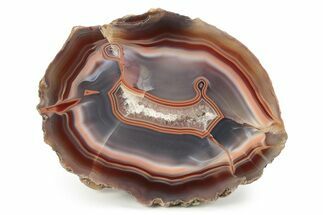This Specimen has been sold.
3.1" Polished, Banded Carnelian Agate - Madagascar
This is a vibrantly colored, banded carnelian agate from Madagascar. This high grade formation of carnelian agate has been entirely polished to a glossy finish.
About Carnelian
Carnelian is a semi-precious variety of chalcedony that features an orange or orange-red coloration. Its name is believed to come from the Latin word carneus, meaning 'flesh colored'. The reddish color is caused by iron oxide impurities in the silica that makes up the chalcedony. Carnelian is one of the oldest known gemstones. It was widely used in ancient Rome to make insignias and seals for imprinting on letters or important documents because hot wax does not stick to carnelian.
Carnelian is a semi-precious variety of chalcedony that features an orange or orange-red coloration. Its name is believed to come from the Latin word carneus, meaning 'flesh colored'. The reddish color is caused by iron oxide impurities in the silica that makes up the chalcedony. Carnelian is one of the oldest known gemstones. It was widely used in ancient Rome to make insignias and seals for imprinting on letters or important documents because hot wax does not stick to carnelian.
About Agate
Agate is a variety of microcrystalline quartz (chalcedony) that displays translucence and, in some cases, banding. Agate primarily forms when silica-rich fluids fill pockets within rocks and/or fossils, depositing the silica along the walls of the rock. This process can result in banding patterns, as the compositions and impurities of these depositing fluids change over time. These banding patterns can either form as flat layers, creating linear patterns known as waterline agate, or as rounded layers, forming more common ring-like patterns. These patterns depend on the surfaces available for deposition.
Agate is a variety of microcrystalline quartz (chalcedony) that displays translucence and, in some cases, banding. Agate primarily forms when silica-rich fluids fill pockets within rocks and/or fossils, depositing the silica along the walls of the rock. This process can result in banding patterns, as the compositions and impurities of these depositing fluids change over time. These banding patterns can either form as flat layers, creating linear patterns known as waterline agate, or as rounded layers, forming more common ring-like patterns. These patterns depend on the surfaces available for deposition.
SPECIES
Chalcedony var. Carnelian Agate
LOCATION
Madagascar
SIZE
3.1 x 1.75"
CATEGORY
SUB CATEGORY
ITEM
#145950
 Reviews
Reviews














